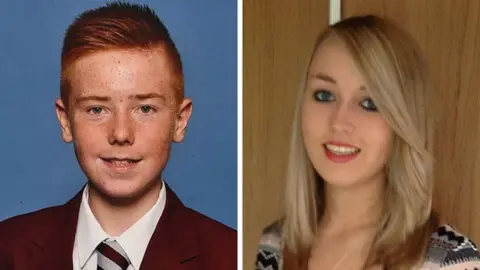Catalogue of failures led to young prisoner deaths
 BBC
BBCThe deaths of two young people at a young offenders' institution could have been avoided but for a "catalogue of failures" in the system, a sheriff has concluded.
Katie Allan, 21, and William Brown, 16, also known as William Lindsay, took their own lives in separate incidents at Polmont Young Offenders Institution in 2018.
A fatal accident inquiry heard how both inmates were vulnerable while at the Polmont facility near Falkirk.
In a damning assessment of the Scottish Prison Service and healthcare services, the sheriff also found reasonable precautions could have been taken to avoid their deaths.
Sheriff Simon Collins KC has made 25 recommendations, including for the prison service to make definite and practical steps to make cells safer.
The sheriff criticised the failure for this to happen in the years since Katie and William's deaths.
 SPS
SPSSheriff Collins found that William's death resulted from a catalogue of individual and collective failures by SPS and healthcare staff at Polmont.
He said "almost all of those who interacted with him were at fault to some extent."
He said a reasonable precaution would have been to have kept William – who had a history of attempting suicide – on observations.
He was removed from observations the morning after he arrived at a case conference. The sheriff also found that the cell he was accommodated in could have been made safe for him.
William had been arrested after walking into Saracen Street police station in Glasgow while carrying a knife.
He was remanded in custody after being deemed a "potential risk to public safety" three days before his death because there was no space in a children's secure unit.
In Katie's case, the sheriff found that there were multiple failures by prison and healthcare staff to properly identify, record and share information relevant to her risk.
However, he said that even with the benefit of hindsight, her death had been spontaneous and unpredictable.
Sheriff Collins found that if the Glasgow University student's cell had been made safe - which could have been done without significant cost - her death would not have happened.
There was a safety issue with the cell that had long been known to the SPS.
Katie was serving a 16-month sentence for dangerous and drink driving following a hit-and-run.
Her mother Linda said she felt "anger, relief, vindication, pain and ever-present grief" when she was finally able to read the FAI report.
"Katie was brutalised in Polmont," she said. "So much so that she lost all hope and saw only one solution – her death.
"She did not 'thrive' as claimed by a witness at her FAI – she was bullied, she was petrified, she was lost."
The families are now calling for a complete overhaul of fatal accident inquiries to make their recommendations legally binding.
William's brother John Reilly said: "Why could this ever be allowed to happen to a child? He was my baby brother. He was just a terrified little boy.
"Whilst some would call the system corrupt, well I just call it the Scottish Prison Service, who act as they though are a god with a total freedom to kill.
"There are those who should be in prison for William's death, yet they have never suffered any consequences and it is time the law was changed."
Linda Allan added: "The prison service literally gets away with creating the circumstances by which people die prematurely, no sanctions exist, they cannot be criminally prosecuted.
"Unless this changes, another Katie or another William will lose their lives. Three have already done so in Polmont since 2018."
Katie's brother Scott, 21, told BBC Scotland News he believed the justice system had killed her.
He said she was vulnerable, abandoned and "destroyed" by a system meant to be keeping her safe.
In his report, Sheriff Collins criticised the failure to make cells safer in the years since Katie and William's deaths and said there should be an audit of cells and an improvement programme implemented.
Other recommendations include:
- A pilot at Polmont for the use of technology, such as heart rate monitors and respiratory monitors, to check patients in mental health units. This is already being used in other secure mental health settings.
- All information available to the court when a young person is sent to custody should be passed to the Scottish Prison Service (SPS).
- A dedicated 24-hour telephone line should be set up for families to report concerns they have relevant to suicide risk, with such concerns immediately acted upon and recorded.
- Bullying concerns should be promptly and proactively shared with the senior prison officer on duty.
- Forth Valley Health Board should ensure that referrals made by the mental health team at Polmont are immediately reviewed by a mental health nurse and, where necessary, acted on without delay.
- All young people should be put on observation for a minimum of 72 hours following admission and should not be removed until a case conference has decided that.
William's former youth worker, Niall Cahill, told BBC Scotland News that Polmont had been repeatedly informed about the teenager's background and his suicidal thoughts.
"SPS and Polmont staff didn't listen. We phoned and phoned and phoned and told them 'do not believe this boy if he says he isn't going to do it. He is going to do it'."
Mr Cahill said William, who spent most of his life in the care system and had lived in 27 different placements, had told his half-sister he was being bullied by prison officers and inmates at Polmont and was "terrified".
According to his medical notes, William had thought about or attempted to take his own life on 14 occasions.
 PA Media
PA MediaA Scottish Prison Service spokesperson said it offered "sincere condolences and apologies for the failures identified in this report".
They added: "We are committed to doing everything we can to support people and keep them safe during the most challenging and vulnerable periods of their lives.
"We are grateful to Sheriff Collins for his recommendations, which we will now carefully consider before responding further."
In a statement, NHS Forth Valley apologised for the failures relating to healthcare services highlighted in the report.
It said: "A wide range of actions have been taken over the last six years to improve and strengthen prison health services and support."
The board said it would now consider the recommendations from this inquiry "to identify any actions or learning to further improve prison healthcare services".
Reforms introduced
The Solicitor General for Scotland, Ruth Charteris KC, said: "I would again wish to acknowledge the deep anguish that the deaths of Katie and William have brought to their families and appreciate that the wait for these proceedings has been too long.
"Since their deaths, the Crown Office and Procurator Fiscal Service has introduced reforms designed to reduce the time it takes to investigate deaths, improve the quality of such investigations, and improve communication with bereaved families.
"As part of these reforms, a specialist custody deaths investigation team has been set up to focus on cases such as those of Katie and William."
